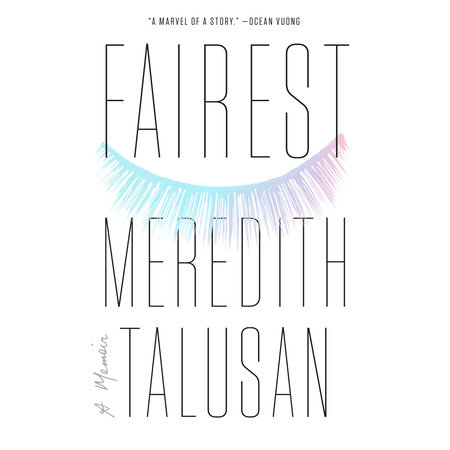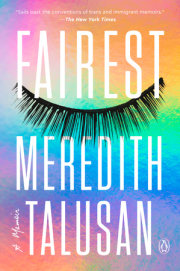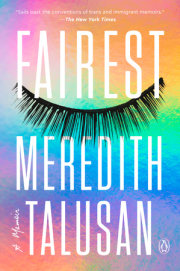1.
Among my people, it is a widely held belief that an infant would become whatever its mother had craved-sugar and a child would turn out sweet, for instance, or plantains and the baby would grow sturdy. Pregnant women were therefore advised not to spend too much time in the sun and certainly not to stare at it directly, for fear that their baby would be born anak araw, a sun child, the strangest creature whose skin was so pale it glowed, and who couldn't open its eyes except to squint, destined to be nearly blind, an affront against nature.
Yet on the long bus ride from my parents' house in Manila to my hometown of Talacsan in the province of Bulacan, my grandmother Nanay Coro told me that as soon as she held me in her arms, she was sure I was a blessing. She refused to allow anyone to talk about me any other way, especially because I was destined to live in America, the richest of countries, where Mama's father, Lolo Bert, had settled, full of people who looked like me. And anyway, I wasn't like other anak araw. My mother stayed away from the sun when she was pregnant but craved sweet corn, and so that was how I must have ended up with corn silk hair and fair skin. Though I did burn in the sun, I wasn't near blind like I was supposed to be, only nearsighted, which was lucky since I wouldn't have known what to do with myself if I couldn't read. As our bus sped across the highway through an endless series of rice paddies, which I perceived as patches of yellowish brown since it was April and the fields had been harvested, my grandmother assured me that I was meant for a better future than her and our ancestors, farmers who had tilled soil in the fields surrounding our village for generations.
"This is because you are fair and beautiful," she said, "not dark and ugly like me."
I learned not to protest because I'd heard similar words many times before, not just from her but from other relatives and neighbors in Talacsan, where I lived until I was three. I'd spent the last two years going to school in Manila and only making weekend visits back to the place I still considered home, but after my grandmother discovered that Mama had been locking me in my bedroom to go out after I fell asleep, and having learned that a distant cousin had died in a fire in the middle of the night, she insisted that I return to Talacsan and wait another year to start first grade with other kids my age.
"There are people in Manila who think I look abnormal," I said.
"They're just jealous they don't have a child like you."
I looked forward to living in Talacsan again, where no one found me strange. We eventually got to the bus station in Baliwag, the closest city to our municipality, where Nanay and I walked to the jeepney stand for our town. There were no jeepneys when we got there, which meant that it would be at least a thirty-minute wait, so Nanay Coro decided to stop by the dry market to get some supplies. On our way, we passed by a store that sold cassettes, and I asked my grandmother if she would buy me one. Papa owned cassettes back in Manila, but I'd never had one of my own.
We came in from the afternoon light, and I blinked as my eyes adjusted to the darkness of that tiny stall, where a woman sat over a glass cabinet filled with cassettes. We were in a hurry, so Nanay Coro asked the store owner to suggest a tape for me to buy. The woman contemplated for a moment, then opened the cabinet to pull out a cassette titled "Small Voice," with a picture of a girl in pigtails named Lea Salonga.
"She's not as white as you but her voice is beautiful," the woman said.
The vehicle was nearly full when we returned to the stand, but people made room. The jeepney had padded seats and open windows on two sides. In the middle were various goods obtained from Baliwag-fruits and vegetables, sacks of rice, even an actual chicken in a wire cage. There were murmurs once we got on, and I sat on Nanay Coro's lap.
"Your skin is so white!" the woman next to me exclaimed as she touched my arm. The jeepney rumbled then began to move, and I looked out the window to observe the path to my village.
We turned onto a dirt road that led to our municipality, San Rafael, Bulacan, and drove through a succession of villages-Caingin, Pantubig, Poblacion-groups of mostly wooden houses with thatch roofs, the larger ones raised one story high to protect them from floods, with a few newer ones made of concrete blocks piled on top of one another, filled with cement, then painted in bright, pastel colors. Our route took us by the vast Angat River, visible down a slope, past trees and rows of raised wooden houses near its bank. I craned my neck to see the other side of the river as the jeepney passed, just a flurry of green and brown patches, and I asked Nanay Coro whether there were boats that traveled across the water.
"Sometimes," she replied. "But most people just go by land."
"They could build a bridge."
"The river is too wide here," she replied. "They can only do that in America."
Everything seemed easier in America-easier to live, easier to travel. As I gazed across the river, I recognized that even though I loved it here, there was another part of me that was so curious about elsewhere, and I would always have to pick between my riverbank or the other, home or away from home, the Philippines or America. The thought of it left me with a sadness I'd never felt before.
Though I grew happy again when I registered the long stretch of fields that led to our village, as the jeepney's motor emitted a soft roar on its way up the long hill, our family house near the top, a wooden structure raised on a foundation of stones. I was home.
I ran up the stairs and told my younger aunt Tita Nanette, a plump girl only three years older than me, that Nanay Coro got me Lea Salonga's cassette. My grandmother took out a portable tape player from inside a dresser, as the three of us sat on the wooden bench in our common room and listened to the tape for the first time. I was unprepared for the beauty of Lea Salonga's voice-clear and resonant as a church bell-so it took me some moments to notice that she sang in English, and I didn't fully understand her. But once I did recognize the language her songs were in, I sensed that Lea didn't sing in English like other Filipino singers I'd heard on the radio, because she sounded actually American, in a way I couldn't describe.
My grandmother and aunt left me to prepare dinner, but I stayed on that bench and listened to the entire album, then listened to it again, and so many more times over the following days and weeks that my family teased me about having a crush on Lea. I'd been exposed to English through TV shows and American pop music on the radio, but when I listened to that girl, I felt an urge to learn the language like her, so I could sing her songs as well as she did. I tried to copy her pronunciation, and over time, I too became aware of v's and th's that didn't exist in Tagalog, and that my tongue needed to relax so I could pronounce English's softer sounds. If a Filipino girl like Lea could develop the ability to perfect her English and sound American, then I became hopeful I could someday learn English so well that everyone would just think of me as an American boy, that no one would ever know where I actually came from.
One night, I figured out that I could listen to Lea Salonga in the dark before bed, even when my grandparents and aunts slept with me on the seagrass mat in our common room, under a giant mosquito net. If I pressed my ear against the tape recorder's speaker, I could play "Small Voice" low enough that I wouldn't disturb them but loud enough that I could hear. I mouthed Lea's words when she sang and found to my wonder that the direct contact between the speaker and my ear formed a connection between Lea's voice, my mind, and my mouth, so I felt the eerie sensation that Lea was singing through me, as those wondrous sounds vibrated inside my body. For a moment, it felt as if I was Lea Salonga herself, and that feeling made me want to be her, so much that I wouldn't mind being a girl if only I were blessed with her voice.
The next afternoon, after she had finished her chores and the sun was no longer too punishing, Nanay Coro took me to see relatives on the other side of our village. My grandmother used an umbrella to protect me from the sun, as we left our house and walked down the dirt road that ran through our hamlet of a few hundred people. We passed the town chapel, a couple of sundry stores, and porches where mostly men and a few women whiled the day away playing billiards or cards. Nanay Coro greeted everyone and encouraged me to do the same, though I tried not to be overly enthusiastic so we wouldn't end up lingering too long.
Our neighbors were used to me by then, not like in other towns, where children and their mothers often ran after me to touch my hair and skin. Still, several women we passed exclaimed, "He's so white!" when they saw me. I'd learned to take my special place in our village for granted, how I could command attention just by showing up, make people squeal or clap with a cute expression.
One of the houses on our path belonged to Nanang Lita, a distant cousin of my grandmother's, who had a twelve-year-old son named Jembong. We found him sitting on top of his mother's cement porch balustrade, in bright blue shorts and a thin, sleeveless shirt, one leg on the railing and another swinging down to the ground, supporting himself with one hand behind him like one of those pinup girls I'd seen in Papa's magazines.
"Have you found a boyfriend yet?" Nanay Coro teased as we passed.
Even at his age, Jembong was already well-known in our village as bakla, a boy who acted like a girl and liked other boys. I'd seen plenty of bakla on TV, though that boy was the first I'd met in person, as he covered his mouth with one hand in an expression of playful shock.
"Ay, I'm too young," Jembong replied. "I want to remain a virgin until marriage."
The neighbors behind him laughed. "You know you can have a boyfriend and still be a virgin," my grandmother joked.
"I know, but we must remember the words of Our Father," he said, as he put his palms together, closed his eyes, and feigned prayer. "'Lead us not into temptation,' and by temptation He means boys." This produced a fresh peal of laughter from our neighbors, and I found myself laughing too even though I didn't know exactly what "virgin" meant, just that it was good to be one like the Virgin Mary. I was also perplexed over how Jembong allowed himself to be made fun of so openly, even if it was just my grandmother's good-natured ribbing. It was clear enough that Jembong provoked so much laughter because everyone assumed he could never get a boyfriend, that no one ever wanted to love a bakla, which was also the constant theme of those comedies on TV, the desperation of these creatures, who were tolerated but never wanted.
We continued our walk and passed by my great-grandmother Inang's house, where she had planted a fruit orchard in the back. She gave us some guavas she picked herself, before sending us off to Nanay Coro's younger sisters, Mommy Seleng and Ine, who lived next to each other just a few houses down. Once we got there, we sat on Mommy Seleng's porch with her four children, who were a few years older than me, and Ine came over with her two sons.
As the adults were catching up, I decided to go inside the house to get myself a glass of water. I walked around the porch to the front door of the low structure with unpainted cement walls and a metal roof that clanged when it rained, unlike our own traditional wood-and-thatch dwelling. I took off my slippers as I went inside, and the cement floors felt cool under my feet. I walked to the kitchen in the back, pulled up a chair in front of the sink, reached for a glass on a metal rack, and opened the faucet to get my water.
After I filled my glass, I sat next to Mommy Seleng's bright blue plastic-covered kitchen table to drink; I could hear voices from the porch but couldn't understand what they were saying. I liked being alone with my thoughts, a quality that felt different from other children in my village, who often spent all their waking hours with people, playing among other kids or helping family with chores, then sleeping with their entire household in the same room. I realized how much I enjoyed getting relief from too much attention and promised myself that I'd spend more time alone inside in future visits to my great-aunt.
Amid the faint human voices, I suddenly heard a low moan from another direction, which sounded like a wounded animal. I thought I imagined it until I heard the sound again and stood up to find where it came from, somewhere near the back of the house. I got to a door to another room I hadn't realized was there, with windows that looked onto the kitchen, covered by green curtains from inside so I couldn't peek through them. I reached out my hand to open the door, but the metal knob resisted me. It was locked. I took a step back, then another, and was ready to turn away when I noticed a shadow from inside the room, humanlike but swaying in an odd way as it moved closer, got bigger. It wasn't long before I spied fingertips on one of the curtain edges, and I wanted to run, but curiosity and fear tied up my feet. An older boy's face emerged behind those fingertips, a face I recognized because it was mine but dark, mine but with drool coming out of its open mouth, mine but without comprehension in its glazed eyes. The boy I thought was an animal moaned again, louder, and then again, and again. I resisted the urge to scream, ran back to the entrance, and encountered Mommy Seleng in the living room, who rushed to the moaning boy, then my grandmother, who took me in her arms.
Copyright © 2020 by Meredith Talusan. All rights reserved. No part of this excerpt may be reproduced or reprinted without permission in writing from the publisher.










